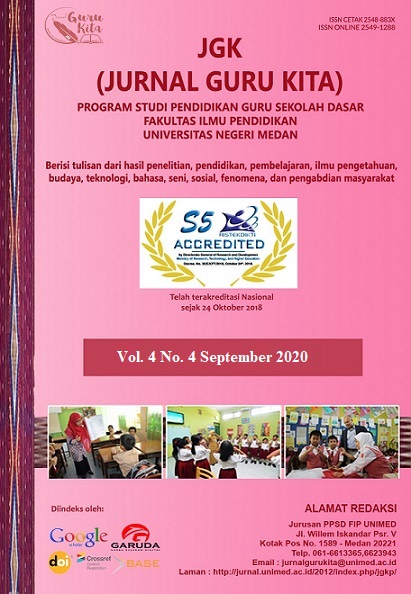INSTRUMEN EVALUASI PROGRAM PENDIDIKAN DI MTS LAB. UINSU, MEDAN
DOI:
https://doi.org/10.24114/jgk.v6i3.36377Abstract
Abstract : Training is seen as the primary method for dealing with different social issues in many countries, and for certain issues, public government assistance rests on the shoulders of schools and colleges. The implementation of the instructive program must be seen from a different perspective. This point of view combines public authorities as strategy creators, clients and regions as teachers in proportion to program continuity. The evaluation, called program assessment, is expected to be able to decide the outcome of the instructive program being run. This is often referred to as an educational program assessment, basically because it assesses an educational program. Ranking empowers students to effectively take part in long-term learning, educators to work more on the nature of the educational experience, and schools to work more on the tools and nature of board schools. However, relying solely on student implementation and educational evaluation to assess the progress of a learning program is not enough. Evaluation is a movement to collect valuable data for an independent direction and is used as a proportion of the extent to which a goal can be achieved. Program assessment is a technique for deciding project implementation by comparing the program and the specific measures or objectives achieved and the results achieved.Keywords: Program Evaluation, Instrument, EducationAbstrak : Pelatihan dipandang sebagai metode utama untuk menangani isu-isu sosial yang berbeda di banyak negara, dan untuk isu-isu tertentu, bantuan pemerintah publik berada di pundak sekolah dan perguruan tinggi. Pelaksanaan program instruktif harus terlihat menurut perspektif yang berbeda. Sudut pandang ini menggabungkan otoritas publik sebagai pencipta strategi, klien dan daerah sebagai guru sebanding dengan kelangsungan program. Evaluasi yang disebut penilaian program diharapkan dapat memutuskan hasil dari program instruktif yang dijalankan. Hal ini sering disebut sebagai penilaian program edukatif, pada dasarnya karena menilai sebuah program edukatif. Peringkat memberdayakan siswa untuk secara efektif mengambil bagian dalam pembelajaran jangka panjang, pendidik untuk lebih bekerja pada sifat pengalaman pendidikan, dan sekolah untuk lebih bekerja pada peralatan dan sifat sekolah dewan. Namun, hanya bergantung pada pelaksanaan siswa dan evaluasi pendidikan untuk menilai kemajuan program pembelajaran tidak cukup. Evaluasi adalah gerakan untuk mengumpulkan data yang berharga untuk arah independen dan digunakan sebagai proporsi sejauh mana suatu tujuan dapat dicapai. Penilaian program adalah teknik untuk memutuskan pelaksanaan proyek dengan membandingkan program dan ukuran atau tujuan tertentu yang dicapai dan hasil yang dicapai.Kata Kunci : Evaluasi Program, Instrumen, PendidikanReferences
Afrizal. (2014). Metodologi Penelitian Kualitatif. Jakarta: Rajawali Pers
Black, N. (2006). Consensus Development Methods. Oxford: Blackwell Publishing
Cooper, N., Sutton, A and Abrams, K. (2002). Decision analytic economic model-ling within aBayesian framework: application to prophylactic antibiotics use for caesarean section.Statistical Methods in Medical Research, 11, 491-512.
Djaali, H., & Muljono, P. (2008). Pengukuran dalam bidang pendidikan. Jakarta: Grasindo, 2(8)
Djaali, Mulyono. 2004. Manajemen dalam Personalia. Yogyakarta : Gajah Mada Universitas
Fahrurrozi, M., & Majid, M. A. (2017). Developing Edmodo-based Blended Learning Model in Forming Student Learning Independence in Economic Subjects Xi Ips Sman 1 Selong Academic Year 2017/2018. JPEK: Jurnal Pendidikan Ekonomi Dan Kewirausahaan, 1(1), 57“67.
Gunawan, Imam. (2013). Metode penelitian dalam kualitatif. Jakarta: Bumi Aksara
Hasanah, H. (2017). Teknik-Teknik Observasi (Sebuah Alternative Metode Pengumpulan Data Kualitatif Ilmu-ilmu Sosial). At-Taqaddum, 8(1), 21-46.
Long, T. & Johnson, M. (2000). Rigour, reliability, and validity research. Clinical Effectivenessin Nursing, 4(1), 30-37.
Mahmudi, I. (2011). CIPP. œSuatu Model Evaluasi Program Pendidikan. At, 6(1), 23
Mulyadi, M. (2011). Penelitian kuantitatif dan kualitatif serta pemikiran dasar menggabungkannya. Jurnal studi komunikasi dan media, 15(1), 128-137.
Narbuko, C., & Achmadi, A.H. (2004). Metodologi Penelitian. Jakarta: PT Bumi Aksara.
Noermanzah, H. F. (2019). Development of Competency-Based Poetry Learning Materials for Class X High Schools. International Journal of Recent Technology and Engineering, 8(4), 6631“6638. https://doi.org/10.35940/ijrte.d8855.118419
Rachmawati, I.N. (2007). Pengumpulan data informasi dalam penelitian kualitatif : wawancara. Jurnal Keperawatan Indonesia, 11(1), 35-40.
Rahmat, P. S. (2009). Penelitian kualitatif. Equilibrium, 5(9), 1-8.
Rusyidi, Tien. 2017. Pengantar evaluasi Program Pendidikan. Medan : Perdana Publishing
Suharsimi Arikunto, Cepi Safruddin abdul jabar. 2018. Evaluasi Program Pendidikan. Jakarta : Bumi aksara.
Suharsimi Arikunto. 1988. Pengelola Kelas dan Siswa. Jakarta : CV Rajawali
Wijayati, P., Suyata, S., & Sumarno, S. (2013). Model evaluasi pembelajaran berbasis kaizen di sekolah menengah atas. Jurnal Penelitian dan Evaluasi Pendidikan, 17(2), 318-332. Retrieved from http://journal.uny.ac.id/index.php/jp ep/article/view/1703
Yusuf tayibnapis. 2000. Evaluasi Program. Jakarta : Rineka Cipta
Downloads
Published
How to Cite
Issue
Section
License
Authors published with the JGK (Jurnal Guru Kita) agree to the following terms:
- Authors retain copyright and grant the journal the right of first publication with the work simultaneously licensed under a Creative Commons Attribution License (CC BY-SA 4.0) that allows others to share the work with an acknowledgment of the work's authorship and initial publication in this journal.
- Authors are able to enter into separate, additional contractual arrangements for the non-exclusive distribution of the journal's published version of the work (e.g., post it to an institutional repository or publish it in a book), with an acknowledgment of its initial publication in this journal.
- Authors are permitted and encouraged to post their work online (e.g., in institutional repositories or on their website) prior to and during the submission process, as it can lead to productive exchanges, as well as earlier and greater citation of published work. (See The Effect of Open Access)


























